外研版九年级英语上模块二教案
- 格式:doc
- 大小:28.50 KB
- 文档页数:3

外研版九年级英语上模块二教案篇一:外研版九年级英语上模块二教案Module 2 Great books王爱霞一、教学内容分析本模块的话题是谈论书、作家、思想家、戏剧、电影、诗歌等。
语法是一般现在时被动语态。
二、学情分析谈论书、作家、思想家等是学生感兴趣的话题。
本模块的学习是通过该话题的讨论,学习并掌握一般现在时被动语态的肯定句、否定句、一般疑问句和特殊疑问句。
三、教学目标1、语言知识目标:● 功能:谈论书、作家、思想家等。
● 词汇:1)能正确使用下列单词:work,influence,respect,wise,literature,behaviour,cave,freedom,funeral,social,theme,treasure,clever ,dead,pleased, alive, southern, state.2) 理解下列单词:thinker, monthly, outsider, version, historical,editor, publisher, reviewer.3)能准确理解并使用下列词组;as far as,not?anymore,millions of,run away, grow up, talk about, be known as/for● 语法:一般现在时被动语态。
2、语言技能目标听:通过听进行单词和图片的配对。
说:谈论最喜欢的书、戏剧、诗歌和作家等。
读:能读懂对书、作家、思想家等作介绍的文章,能掌握从文章到表格的信息转移。
写:写一本自己最喜欢的书。
3、情感目标:培养学生阅读的习惯,提高个人文化修养。
4、文化意识目标:了解中外著名的作家、思想家、诗人及他们的作品。
四、教学重点、难点重点:key vocabulary___work,influence,wise,clever,behaviour,dead,alive,treasuretheme, southern,as far as,not?any more,millions of,run away,grow up,talk about, be known as/for难点:被动语态的构成和用法,主动语态如何改为被动语态。
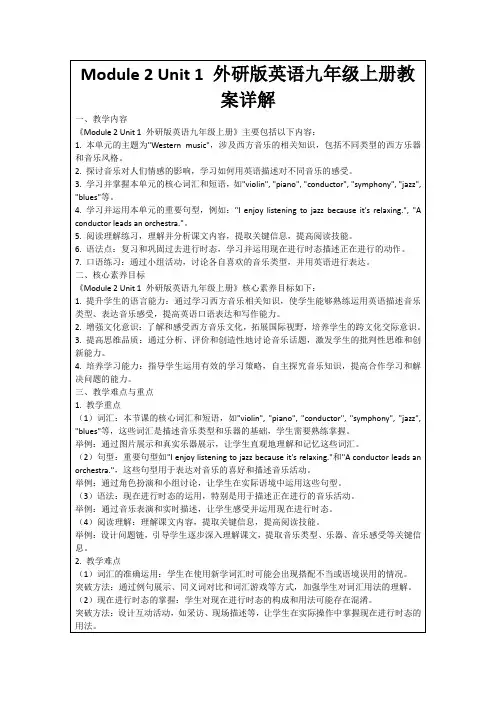
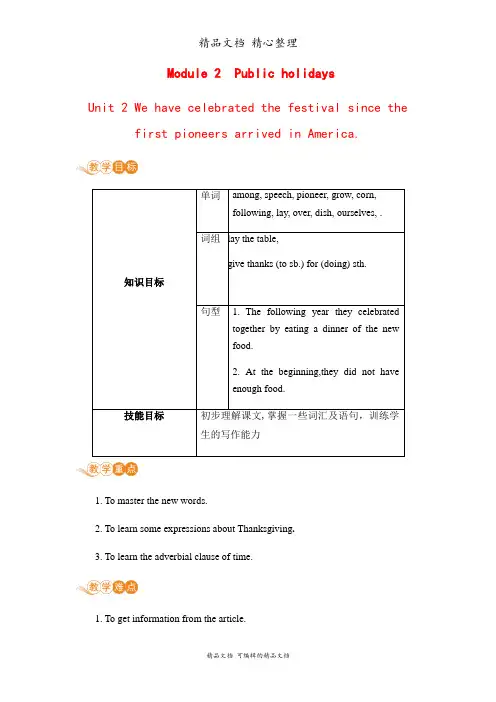
Module 2 Public holidaysUnit 2 We have celebrated the festival since the first pioneers arrived in America.单词among, speech, pioneer, grow, corn,1. To master the new words.2. To learn some expressions about Thanksgiving.3. To learn the adverbial clause of time.1. To get information from the article.2. To write a composition by using the adverbial clause of time.Step 1情景导入1.The teacher shows the pictures of Thanks giving and asks questions.T:Which festival is this?S:Thanksgiving.T:Great. When is it celebrated, do you know?S:On the fourth Thursday in November.T:Do you want to know how it is celebrated?S:Yes.T:Now let\'s look at the pictures and learn about it.2.T:Last period, we read the passage about Thanksgiving. We learn about its facts. Can you tell me its date, meaning, history and celebration?S1:…S2:…T:You may forget some of the facts. You should read the passage again.Step 2完成教材 Activity 1的任务和教材 Activities 3,4的任务。
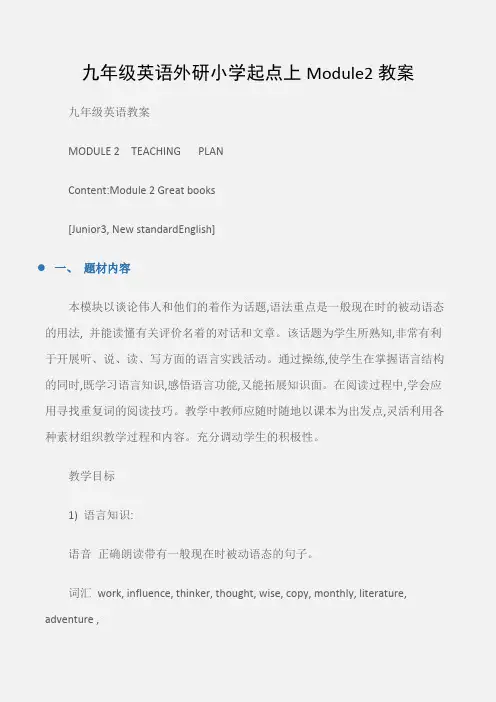
九年级英语外研小学起点上Module2教案九年级英语教案MODULE 2 TEACHING PLANContent:Module 2 Great books[Junior3, New standardEnglish]一、题材内容本模块以谈论伟人和他们的着作为话题,语法重点是一般现在时的被动语态的用法, 并能读懂有关评价名着的对话和文章。
该话题为学生所熟知,非常有利于开展听、说、读、写方面的语言实践活动。
通过操练,使学生在掌握语言结构的同时,既学习语言知识,感悟语言功能,又能拓展知识面。
在阅读过程中,学会应用寻找重复词的阅读技巧。
教学中教师应随时随地以课本为出发点,灵活利用各种素材组织教学过程和内容。
充分调动学生的积极性。
教学目标1) 语言知识:语音正确朗读带有一般现在时被动语态的句子。
词汇work, influence, thinker, thought, wise, copy, monthly, literature, adventure ,behaviour , cave , freedom , funeral , century ,outsider , pretty , social , theme , treasure , clever , dead ,hide-hid-hidden , pleased , alive , punish , state , southernversion , historical , actually , rewrite-rewrote-rewritten , intend , rather ,publisher , reviewer , unpleasant词组What's up? as far as , not …any more , millions of , at the end of , run away , grow up , talk about语法一般现在时的被动语态的概念和用法功能掌握表示同意和不同意的表达方式,如I gree/ I don't agree话题以"谈论伟人和他们的着作为"为话题。
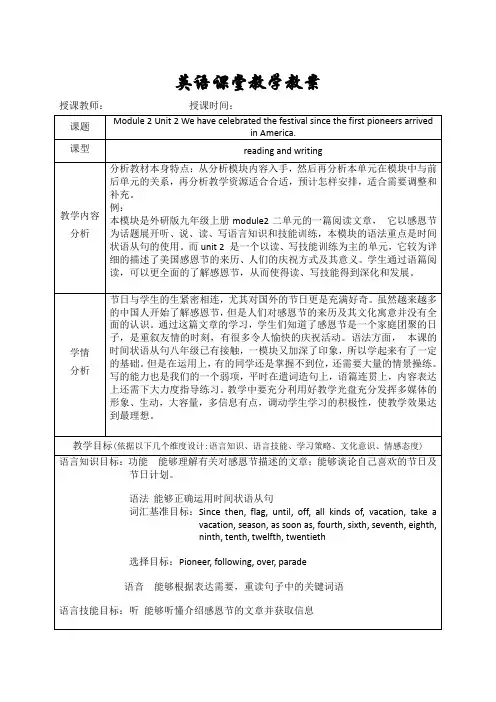
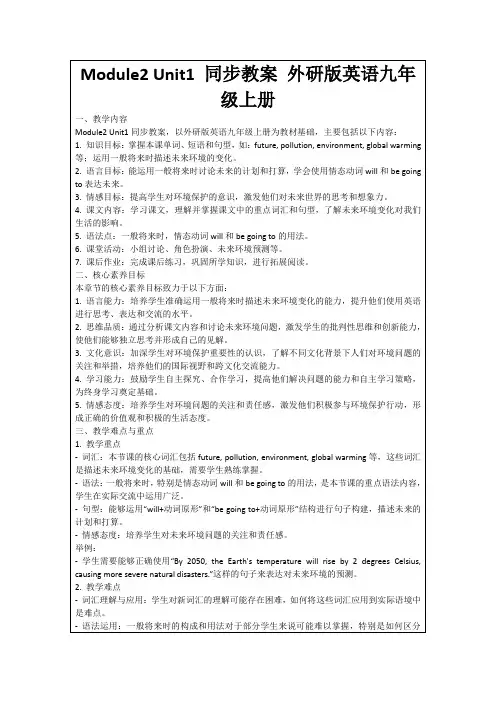
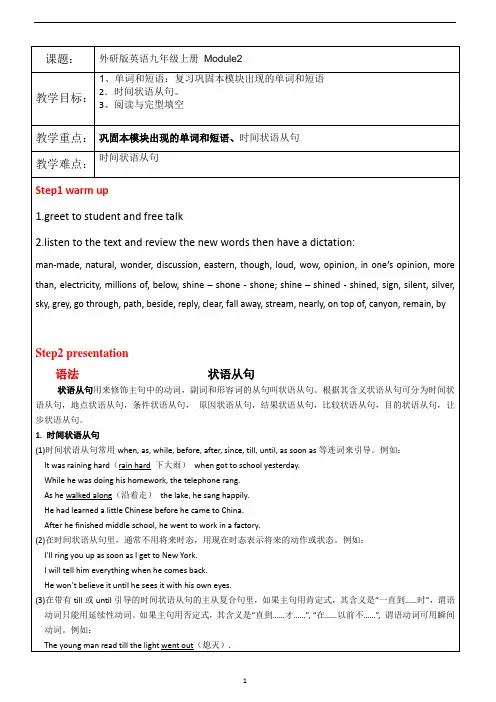
Let’s wait until the rain stops.We won’t start until Bob comes.Don’t get off(从下来)until the bus stops.【Till是指直到某一特定事件发生的时候,而在那个时刻之后,该事情或状况仍将持续。
Until是指直到某一特定事件发生的时候,而讲话的人在自己心里认为,在那个时刻之后,该事情或该状况将中止(不怎么可能持续)。
固定组合里from morning till night,till/until是不能替换的,】1、until 既可作介词,也可作连词,通常有一下几种用法☺用于肯定句中,作“直到......为止”讲时,主句的谓语动词一般是延续到unt il 所指的动作或时间为止。
He waits until the children are asleep.他一直等到孩子们睡着。
We stayed there until it was dark. 我们在那一直呆到天黑。
☺用于否定句中,作“直到......才”讲时,主句的谓语动词一般是非延续性动词,表示主句的动作直到until所指的动作或时间才发生。
He didn't come until late in the evening.他直到晚上很晚才来。
Tom didn't go to bed until he finished his homework. Tom 直到写完作业才睡觉。
ex. 他昨晚直到十二点钟才睡觉。
___________________________________________.重点短语句型:1. The People’s Republic of China was founded on 1st October 1949.found表示“建立,创立”。
它的过去式和过去分词都加ed。
find表示“找到”,它的过去式和过去分词为found。
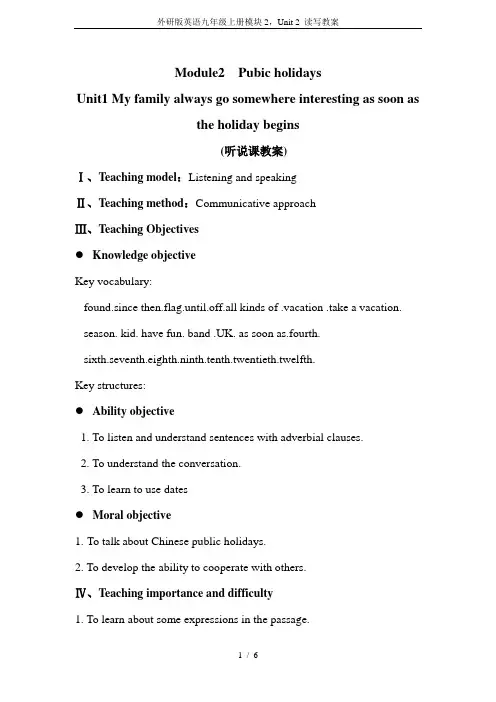
Module2 Pubic holidaysUnit1 My family always go somewhere interesting as soon asthe holiday begins(听说课教案)Ⅰ、Teaching model:Listening and speakingⅡ、Teaching method:Communicative approachⅢ、Teaching Objectives●Knowledge objectiveKey vocabulary:found.since then.flag.until.off.all kinds of .vacation .take a vacation. season. kid. have fun. band .UK. as soon as.fourth.sixth.seventh.eighth.ninth.tenth.twentieth.twelfth.Key structures:●Ability objective1. To listen and understand sentences with adverbial clauses.2. To understand the conversation.3. To learn to use dates●Moral objective1.To talk about Chinese public holidays.2. To develop the ability to cooperate with others.Ⅳ、Teaching importance and difficulty1. To learn about some expressions in the passage.2. To learn to use adverbial clausesV、Teaching methodPWP method, task-based methodVI、Teaching aidsA tape recorder, multimedia and some picturesⅦ、Teaching ProceduresLearning Aims (学习目标)1.To listen and understand the conversation with adverbial clauses.2.. To learn to use the patterns with adverbial clauses correctly:…after.as soon as .before. since. until .when. while3. To talk about public holidays.4. To remember the words and expressions(师傅学友明确学习任务)Step 1: Check the new words . (学习单词)1.师友朗读found.since then.flag.until.off.all kinds of .vacation .take a vacation. season. kid. have fun. band .UK. as soon as.fourth.sixth.seventh.eighth.ninth.tenth.twentieth.twelfth.(师傅注意学友的发音)2.教师检查Task1:请快速说出你看到的单词(师友举手抢答)Step 2: Talk and learn.(学习对话)I.师友听读感知1)Look and talk about the picture.(Activity 1)2)Complete the sentences with the dates(Activity2)(先自主完成再互助交流)3)Listen and check.(先自主完成再互助交流)4)Listen to the passage and pay attention to the pronunciation.5)Read again and complete the table.(Activity3)(先自主完成再互助交流)( 1)学友自主在课文中找到每日英语原句勾画出来When is your national day?Do you have any plans for?We only have one day off.( 2)学友读给师傅听,互助交流用法。
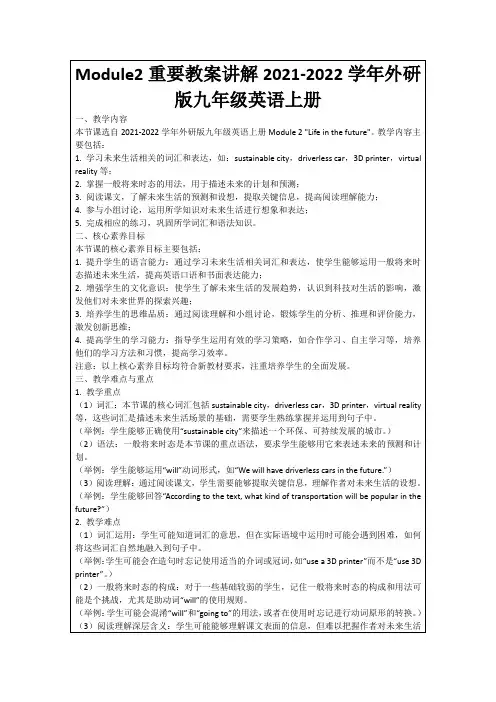
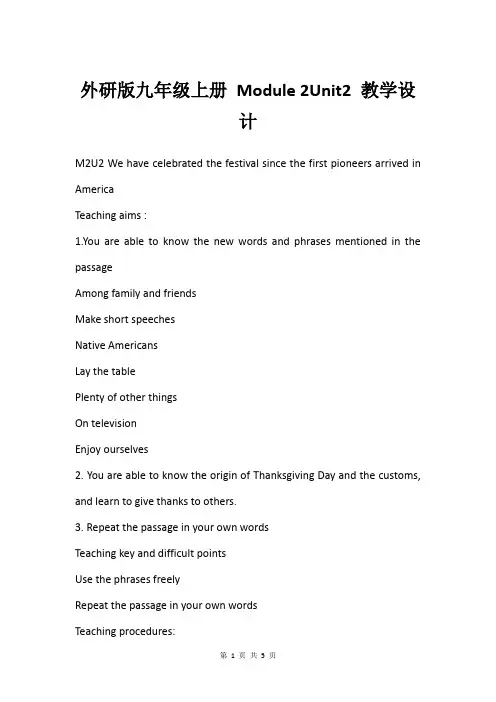
外研版九年级上册Module 2Unit2 教学设计M2U2 We have celebrated the festival since the first pioneers arrived in AmericaTeaching aims :1.You are able to know the new words and phrases mentioned in the passageAmong family and friendsMake short speechesNative AmericansLay the tablePlenty of other thingsOn televisionEnjoy ourselves2. You are able to know the origin of Thanksgiving Day and the customs, and learn to give thanks to others.3. Repeat the passage in your own wordsTeaching key and difficult pointsUse the phrases freelyRepeat the passage in your own wordsTeaching procedures:Step1: lead inToday we’ll still talk about a holiday from America, maybe most of you heard it, Thanksgiving Day, but do you know whom they are giving their thanks to Please follow me to go into this traditional American holiday. Step2: assignmentsAssignment 1: Check the assignments I gave you before class.Words and phrases:·among(family and friends)·Make short speeches·The 1st pioneers·The Native Americans·Prepare the food·The Atlantic·A traditional dinner·Lay the table·Wash the dishes·Macy’s Thanksgiving Day Parade enjoy ourselvesTranslation·It is celebrated on the 4th Thursday in November.·Give thanks for their food.·The parade goes along several streets·Football is also important at Thanksgiving, with many team playinggames.·We usually watch the games on television and enjoy ourselves very much.Assignment2: read the passage twice and finish the mind-map. Assignment3: read again and complete the table according to the mind-mapFacts about ThanksgivingDate _____________________________Meaning ________________for their foodhistory ·Have celebrated it since _________from England arrived in America.·Learnt from the Native Americans how to __________ and celebrated together by __________ of the new food.Celebration ·Celebrate with _______________________ before dinner·Celebrate by watching _________ in New York City and _____on television.Assignment4: speakingTry to repeat the passage from 3 aspects: (three students)When and whereOriginCelebrationYou can start like this: Thanksgiving Day is an American festival, it is celebrated on __________...........Another three students: you can talk about a holiday you are familiar with, you can talk about it from three aspects or other aspects Assignment 5: homeworkFinish exercise 5 on your homework bookWrite down the description about the Thanksgiving Day or other festival you are familiar with you showed in class.whereWhenactivitiessinceDied oforiginThanksgiving DayThe Native AmericanOn televisionNew York CityCelebrationactivitiesoverbeforecelebratetoday。
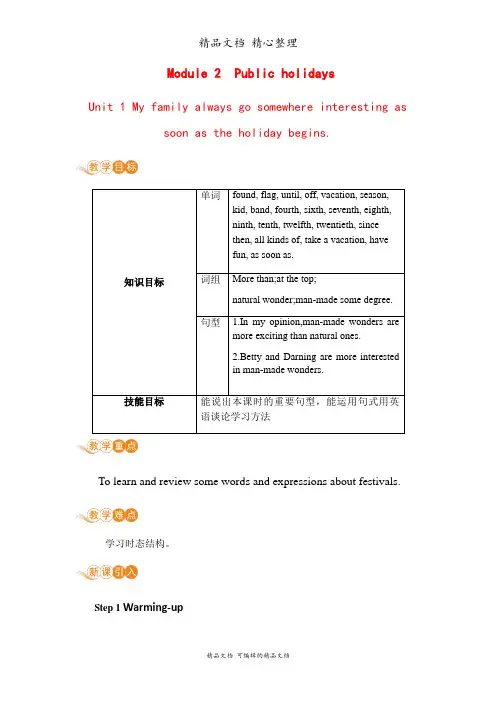
Module 2 Public holidaysUnit 1 My family always go somewhere interesting as soon as the holiday begins.单词found, flag, until, off, vacation, season,To learn and review some words and expressions about festivals.学习时态结构。
Step 1 Warming-upT: Welcome to our class.T:Lead in(1) Listen to a happy song and enjoy some pictures about the public holidays before the lesson.(2) To see a short movie about the things people to do during the public holidays. And then ask the students: What things do they do when the holiday begins? Lead in our today’sS:(1) Listen to a happy song and enjoy some pictures about the public holidays(2). To see a short movie about the things people to do during the public holidays and answer the questions topic .Step 2Task1:Check the new words.T:1. A little teacher show some pictures on the screen, ask some students to answer his questions to get the students to say out the new words.anize the students to read the new words together.3.Check the answers of new words exercises .S:1.See the pictures and things to say out the new words.2.Read the new words together.3.3.Check the answers of new words exercises()1.—The Great Wall is one of the greatest _____ in the world.—I agree you.A.wonder, withB. wonders, withC.wonderful, with()2.____students _____the discussion yesterday.A.3 hundreds; joinedB.3 hundreds of; join inC.Hundreds of; joined inD.Hundreds of; joined()1.—What____ you _____to do this weekend?—I’d like the Great Wall.A.do; like; visitB.would; like; to visitC.do; want; visitingD.would; like; visiting()2.He didn’t have breakfast _____ he got up late.A.s oB.thoughC.becauseD.until答案1.B 2.C 3.B 4.C完成请完成《》P10对应习题本课时以师生问答的形式导入新课,引出本课时的主题wonders。
Module2 Unit2 优质课教案(辽宁省)一、教学目标(一)知识目标1. 词汇:能够在语境下辨识并恰当地运用以下词汇。
i名词speech,pioneer,corn,dish,parade动词grow,1ay形容词fo1lowing 介词among 短语1ay the table2. 语法:能够运用由after,as soon as, before, since, until, when, while引导的时间状语从句,以具有时间逻辑性的方式来描述感恩节的来历和庆祝方式。
(二)技能目标1. 读:能够根据不同的阅读目的,运用不同的阅读策略,读懂一篇约300字的介绍外国节日的文章。
a)能够通过标题和图片,来预测文章的内容。
b)能够抓住段落关键词,来确定段落的主旨。
c)能够梳理文章的行文脉络并理解段落之间的内在逻辑。
d)能够借助文章的行文结构,快速定位细节信息。
e)能够合理推理事件的情节发展。
f)能够评价人物的特点。
g)能理解段落中各句子之间的逻辑关系。
2. 写:能够迁移本课所学的内容,尝试运用由after,as soon as,before,Since,unti1,when,while引导的时间状语从句,以时间为逻辑顺序,以小组为单位来设计一份校园感恩日的活动计划书。
(三)学习策略1. 认知策略:a)在学习中善于记要点。
b)在学习中善于利用图画等非语言信息理解主题。
c)对所学内容主动加以整理和归纳。
2. 交际策略a)善于抓住用英语交际的机会。
b)在交际中,把注意力集中在意思的表达上。
c)借助手势、表情等体态语进行交流。
3. 自学策略:能够通过网络,查阅更多关于西方节日的资料,加深对不同文化传统的认识。
4. 合作学习策略:在小组活动中,善于听取别人的意见,并积极贡献自己的力量。
(四)情感态度加深学生对西方节日的了解,培养学生的感恩之心。
二、学情分析1. 模块的话题是节假日活动,九年级的学生对这个话题即熟悉又很有兴趣。
外研版九年级英语上模块二教案教案一:Unit 1 Good friends教学目标:1. 掌握本单元的重点词汇和短语。
2. 理解并复述本单元的短文。
3. 学会描述和评价人物特征。
4. 学会运用所学知识结合实际情境进行交流。
5. 培养学生的合作意识和创新精神。
教学重点和难点:1. 掌握本单元的重点词汇和短语。
2. 理解并复述本单元的短文。
3. 运用所学知识进行交流和描述人物特征。
教具准备:1. PPT及其他多媒体工具。
2. 单词卡片和图片。
3. 电子词典和录音机。
教学过程:Step 1: Warm-up1. Greetings and self-introduction.2. Show pictures of different friends and ask students to describe their friends' personalities.3. Discuss the qualities that make a good friend.Step 2: Presentation1. Show the flashcards of the new words and phrases in Unit 1.2. Introduce and explain the meaning and usage of each word/phrase.3. Use the words/phrase in a sentence and ask students to repeat.4. Play the audio recording of the words and phrases, ask students to listen and repeat.5. Practice the pronunciation and spelling of the words and phrases.Step 3: Reading and comprehension1. Divide the class into groups of four or five.2. Give each group a copy of the reading passage and ask them to read and discuss the questions.3. Have a class discussion to check the answers and clarify any misunderstandings.Step 4: Speaking and writing1. Ask students to imagine they are introducing their best friend to the class.2. In pairs, students take turns describing their friend's appearance, personality, hobbies, and interests.3. Students can use the new words and phrases they have learned.4. Have some students share their descriptions with the class.Step 5: Extension activities1. Give students a list of famous people and ask them to describe their personalities using the new words and phrases.2. Divide the class into small groups and ask each group to create a poster of a famous person, describing their personality and achievements.Step 6: Homework1. Review the new words and phrases from Unit 1.2. Write a short paragraph describing one of their friends, using the new words and phrases.3. Read a book or watch a movie about friendship and write a review.教案二:Unit 2 Healthy eating教学目标:1. 掌握本单元的重点词汇和短语。
Module 2 Unit 1 Confucius’ works are read by many people(外研版初三上册)一、课型:Listening and speaking二、教材分析本模块以谈论中外伟人和他们的著作为话题,要求学生听懂、读懂有关评价名著的对话和文章,同时正确掌握被动语态的基本结构以及一般现在时的被动语态。
三、教学对象分析1、本学期学生已经进入初三的学习,有了前两年扎实的基础,对于一定的文学常识也会有所了解,因此,关于孔子、莎士比亚及马克吐温的讨论也应该会顺利展开;2、被动语态的学习进入第二周,学生在对其感悟的基础上会试着想去尝试在表达中使用它,这恰好符合了听说课的特点,教师应多为学生创造练习和展示的机会;3、学生还需要教师在学习策略和情感态度方面的给予规范和引领。
四、教学目标1、知识和技能目标(词汇、语音、语法、功能、话题)(行为目标描述,可测量)(1)词汇:能够正确使用下列单词和词组:work, influence, thought, wise, copy, as far as, not…any more, millions of理解下列单词和词组:thinker, What’s up? Monthly, literature (2)语音:正确朗读带有一般现在时被动语态的句子。
(3)语法:掌握一般现在时的被动语态的概念和用法。
(4)功能:掌握表示同意和不同意的表达方式,如I agree/ don’t agree with…掌握表达观点的表达方式,如I /We think …(5)话题:关于三位伟大作家及其著作展开讨论。
2、情感目标:读书是人类获取知识的重要途径,通过本课的学习,引导、教育学生要多读书、读好书。
通过读书吸收前人的智慧,不断丰富学识和提高自身素质。
3、学习策略:(1)在语境中感知被动语态的结构及用法。
(2)能与同学讨论、交流对文学作品的看法。
4、文化意识:加深对中国传统文化的了解,加强对西方著名作家、戏剧家及其文学作品的了解。
外研版九年级上册Module 2 Public holidays教学设计【目标确定的依据】1.相关课程标准的陈述(1)英语课程标准的相关内容摘录听:2.能听懂有关熟悉话题的谈话,并能从中提取信息和观点。
3.能借助语境克服生词障碍、理解大意。
6.能针对所听语段的内容记录简单信息。
说:1.能就简单的话题提供信息,表达简单的观点和意见,参与讨论。
5.能根据话题进行情景对话。
读:1.能根据上下文和构词法推断、理解生词的含义。
3.能找出文章中的主题,理解故事的情节。
5.能根据不同的阅读目的运用简单的阅读策略获取信息。
写:2.能独立起草短文,并在教师的指导下进行修改。
4.能根据图示或表格写出简单的段落。
2.教材分析话题意义:本模块节选自外研版九上Module 2“公共假期”,属于“节假日活动”话题。
通过学习本模块,学生可以了解中外重要节假日的名称,并了解中外不同的节假日庆祝方式以及中西方的文化差异,同时强化时间状语从句的表意功能。
内容解读:第一单元托尼、贝蒂、玲玲和大明一起谈论了国庆节这一话题。
他们分别谈论了中国和美国国庆节的由来,不同的庆祝方式以及家人的节日活动安排。
学习对话的过程中学生要注意日期的表达方式,序数词的构成。
本单元对话引导学生使用时间状语从句表达活动安排,但是学习过程中不要仅仅囿于语言技能的训练,还可以多补充材料,完善本课信息,同时也可以提议学生了解其他东西方节日及文化差异等。
第二单元的文章较为详细地描述了美国感恩节的来历,人们的庆祝方式及其意义。
通过学习这篇文章,学生可以更加全面地了解感恩节,知道感恩节是一个家庭团聚的日子,是重叙友情的时刻,有很多令人愉快的庆祝活动。
教师可以引导学生通过提示写一篇关于中国传统节日的文章,回忆与家人在一起的温馨时刻,以此加深学生对节日文化内涵的理解。
语法重点: 本模块的语法重点是时间状语从句,引导学生通过语境来感悟语法,并让学生通过相应的语言活动来运用,进而达到掌握的目的。
Module 2 Public holidaysUnit 3 Language in use设计说明教学反思本单元主要复习时间状语从句。
通过观察句子,分析句子的结构和意义,归纳各种时间状语从句的用法。
并通过选词或选句填空,提高学生对单词、短语、句型、语法等知识的实际运用能力。
然后通过听录音、问答、写作训练,让学生动脑、动耳、动口、动手,巩固时间状语从句的用法,运用与节日相关的知识。
教学目标通过本单元的教学,让学生达成以下目标:1. 知识目标(1)复习本模块的重点单词、短语及句型。
(2)复习时间状语从句。
2. 能力目标(1)能够运用时间状语从句知识完成各种练习。
(2)能够问答与节日相关的问题。
3. 情感目标通过学习节日的相关知识,了解更多传统习俗和风土人情。
重点难点重点:本模块的重点单词、短语和句子难点:时间状语从句的用法教学准备PPT课件;教材录音等授课时数1课时教学过程Step 1Lead-inLanguage practiceWhile we’re staying with our friends, we’re going to spend one day in Qingdao.Before we begin dinner, my father gives thanks for the food.When it is all over, everyone helps wash the dishes.And my family always go somewhere interesting as soon as the holiday begins.We have celebrated the festival since the first pioneers from England arrived inAmerica.After they landed, their first winter was worse than any English winter.Step 2 Grammar时间状语从句一、什么是时间状语从句一个句子在另一个句子中充当时间状语,那么这个句子就叫做时间状语从句,另一个句子叫做主句。
英语9上外研版Module 2:模块第2课时教学设计(精品)Module2课时备课表(教案)课题Unit1Confucius’s works are read by many people 课型Listening and speaking 第2 课时教学目标知识目标Revision:Revise the new words and some sentences in last lesson.Do with the other activities能力目标Speaking :The students can talk about their own famourite works. Writing:The students can write and review their favourite the great books.情感目标We can teach the students to read more good books by learning it.内容分析重点Revision and writing. The students can grasp the expressions about agreeing or disagreeing and expressing your ideas/thoughts.For example:I agree…./don’t agree with… I’We think…难点Speaking and writing.关键点Key structure: Passive voice教法学法Interactive approachCommunicate approach 教具学具Tape recorder or computerSome materials downloaded from the Internet教学程序教材处理师生活动时间一.Revision:Revise the new words in Unit 11. The students will read Activity 3 in pairs.2. If possible,we’ll do an exercise about the last lesson.Have a dictation.I will read English,the students will write them down in their exercises.二Learning the new points Activity 5 in Unit 1(After understanding Activity 3,we check how the students grasp the words)Ask the students to do this individually,and then check with a partner.Call back the answers from the whole class as complete sentences.Activity 6(The students can express their own ideas with the useful words and phrases.)Activity 7Make a list of:Students work in pairs to do this.Call back suggestions from the whole class.Make columns on the board if I wish.Players:William ShakespearThinkers:ConfuciusWriters:LaosheAsk them to read through the passage by themselves a couple of times.教学程序教材处理师生活动时间三:Pronunciation and speakingActivity 8(They can express their own ideas about something and they can use “I agree/don’t agree with (I)think…”correctly.Actvity 9Some exercises in the WB Group the students to decide what they think about the three statements.Ask them to write down their ideas,and appoint a secretary to report back.At the same time ask the students to pay attention to expressing their agreeing or disagreeing about their ideas or review the great books.Call back the group’ ideas in a whole-class setting,and try to get a discussion going.If we have some time,we’ll do with some exercises in the WB and check the answers with the whole class.板书设计Module 2 Great BooksUnit 1 Confucious’ works are read by many people.(2)The Passive voice: be+p.p The teaching points:一般现在时的被动语态: 1.be known for…Am/is/are/+p.p 2.players/thinkers/writers1.______2.______教学后记。
外研版九年级英语上模块二教案
篇一:外研版九年级英语上模块二 Module 2 Great books 王爱霞一、教学内容分析本模块的话题是谈论书、作家、思想家、戏剧、电影、歌等。
语法是一般现在时被动语态。
二、学情分析谈论书、作家、思想家等是学生感兴趣的话题。
本模块的学习是通过该话题的讨论,学习并掌握一般现在时被动语态的肯定句、否定句、一般疑问句和特殊疑问句。
三、教学目标 1、语言知识目标: ● 功能:谈论书、作家、思想家等。
● 词汇:1)能正确使用下列单词:work,influence,respect,wise,literature,
behaviour,cave,freedom,funeral,social,theme,treasure,clever,dead, pleased, alive, southern, state. 2) 理解下列单词:thinker, monthly, outsider, version, historical, editor, publisher, reviewer. 3)能准确理解并使用下列词组;as far as,not?any more,millions of, run away, grow up, talk about, be known as/for ● 语法:一般现在时被动语态。
2、语言技能目标听:通过听进行单词和图片的配对。
说:谈论最喜欢的书、戏剧、诗歌和作家等。
读:能读懂对书、作家、思想家等作介绍的文章,能掌握从文章到表格的信息转移。
写:写一本自己最喜欢的书。
3、情感目标:培养学生阅读的习惯,提高个人文化修养。
4、文化意识目标:了解中外著名的作家、思想家、诗人及他们的作品。
四、教学重点、难点重点:key vocabulary___work, influence,wise,clever,behaviour,dead,alive,treasure theme, southern,as far as,not?any more,millions of,run away,grow up,talk about, be known as/for 难点:被动语态的构成和用法,主动语态如何改为被动语态。
五、课时安排第一课时:Unit 1 第二课时;Unit 2 第三课时:Unit 3 第四、五课时:Review and workbook Unit 1 Confucius’ works are read by many people Teaching aims :Learn the use of present simple passive. Key points: work, influence, thought, wise, copy, as far as, not?any more, millions of, be known as/forDifficult sentences: Shakespeare’s works are seen by millions of people every year. Mark Twain was an important writer, but he isn’t known as a great thinker like Confucius. Step 1 Warming up leading in 1. Ask the students some questions. Do you like reading books? What’s
your favourite book?Who’s your favourite writer? 2. Show three pictures about Confucius, Shakespeare and Mark Twain. Let them guess who they are. Can you say something about them? Teach the words : work, influence, play, poem, respect, thinker, thought, wise, writer. Confucius: He was a great thinker in China. He is known for his wise thought. We are still influenced by his thought. He is respected by us. Shakespeare: He was a writer of plays and poems. Some of his most famous plays are Hamlet and Romeo and Juliet. He was born in 1564 in England. His plays are seen by millions of people every year. Mark Twain: He was a famous American writer. He wrote a lot of stories. His books are still popular. For example ,The Adventures of Tom Sawyer. 3.Do Activity 5. Complete the sentences with the correct form of the words. Step 2 Listening (Act.1 2) 1. First read the words in the box .Then match the words in the box with the people in the pictures.(Act.1) 2. Listen and check your answer to Act.1.(Act.2) step 3 Listening and reading(Act.3、4) 1. Listen and answer .Where are the speakers? What are they talking about? 2 .Read and answer the questions.(Act.4) 3.Everyday English and language points. What’s up? Go on! Sounds like a good idea. as far as, not ?any more, millions of ,be known as/for 4.Read the conversation in two groups. Step 4 Grammar practice 1. Underline the sentences in the conversation that have the pattern of passive voice. 2. Read the sentences aloud. 3. Do WB Exercise 1 on p116 Step 5 Speaking and writing 1.Do Act.8 Work in groups of three and look at the opinions in the table. Report ideas of your group to the whole class. 2.Do Act.6 Talk about your favourite play/poem/thinker/writer/story. Homework 1. write your favourite play/poem/thinker/writer/story. 2. Listen and read the conversation. 3. Search the internet about the book called The Adventures of Tom Sawyer. Unit 2 It’s still read and loved Teaching aims篇二:外研英语九年级上册第二模块教案沿庄镇中学教科室制沿庄镇中学教科室制
沿庄镇中学教科室制沿庄镇中学教科室制篇三:外研英语九年级上册第一模块教案沿庄镇中学教科室制沿庄镇中学教科室制沿庄镇中学教科室制沿庄镇中学教科室制沿庄镇中学教科室制。